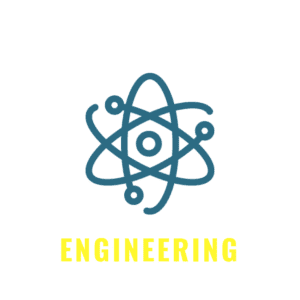Exploring Types of Online Engineering Degrees

Engineering has been around since the beginning of time. The premier example of ancient engineering is the wheel. It is something that is so omnipresent in all of our day-to-day lives, but it can still seem a little bit nebulous as an academic field. Throughout this guide, we hope to discuss in detail exactly what engineering is, the types of academic programs that are available, the career paths you can take, and some additional information about engineering, engineering degrees, and, of course, online engineering degrees as well.
The American Engineers’ Council for Professional Development (even though it has evolved and no longer exists by that name) has defined engineering as: “The creative application of scientific principles to design or develop structures, machines, apparatus, or manufacturing processes, or works utilizing them singly or in combination; or to construct or operate the same with full cognizance of their design; or to forecast their behavior under specific operating conditions; all as respects an intended function, economics of operation and safety to life and property.” That council evolved into the current accrediting board for engineering degrees, so, in an academic sense, that is as precise a definition as you could find.

In simpler terms, engineering is a scientific field that uses society’s scientific understanding of the natural world and uses it to invent, design, and build things to help solve problems or achieve particular goals. That is still a very broad definition because engineering is everywhere. Every career path that you can possibly take will use tools created by engineers. Because of how extremely vast the field is, there are some large categories that engineering breaks down into. These six main types of engineering are Mechanical, Chemical, Civil, Electrical, Management, and Geotechnical. However, there are hundreds of different subcategories under each branch. Engineering is easily the most broad of all the STEM fields, and may even be the broadest out of any academic field.
The first-ever engineering academic program was offered in 1817 by The United States Military Academy, which we know today as West Point. In 1819, the institution that would become Norwich University in Vermont implemented its first engineering program, followed shortly by the Rensselaer Polytechnic Institute in 1825. By the year 1997, there were more than 1,500 engineering programs offered by over 300 different institutions of higher education throughout the country. While there is no set number of programs documented today, there are more than 3,000 American colleges and universities that now offer some type of engineering degree program.
So, it is clear to see that there are a lot of options when it comes to earning an engineering degree! We are going to explore the different types of engineering degrees throughout this guide so that you can get a better understanding of what you would learn in each program and at the different degree levels so you can decide what engineering degree is right for you based on your professional goals.
What Do You Study in an Engineering Program?

What you study in an engineering degree program is going to heavily depend on the type of engineering specialization that you choose, but there are some basic things that every student will have to learn before they get to that point. Typically, you don’t get into more specialized courses until you get to the graduate level; however, with engineering, that is a little bit different. You can add specializations at the bachelor’s level. You can earn a Bachelor of Science in a broad range of different areas of engineering. That is because it is so broad as a whole and the concepts of it differ heavily based on the specific area of the field that you enter. There are not as many basic core principles or concepts to be learned to establish a foundational understanding of the entire field, such as the foundation that you have to build in education or business degree programs.
Typical engineering students need to cover a little bit of base curriculum that covers topics especially in mathematics, physics, chemistry, and computer science. This means that regardless of the specialization you want to pursue, you could see yourself taking calculus, differential equations, general chemistry, programming, introduction to modern physics, and classes that are related to those areas. Since engineering relies heavily on natural science, mathematics, and technology, there will be some ground that you have to cover in those areas before going on to more tailored classes.
There are some introductory classes in the field of engineering that you might be required to take even if they don’t fit into the career path that you have planned. These classes include things like drafting and design, statics and dynamics, materials engineering, and thermodynamics, among others. The thing to keep in mind when it comes to obtaining even an undergraduate-level education in this field, the programs are highly tailored to each specific subcategory. This is good because you may still have to take some general education classes, but beyond that, all of the classes that you take will be directly relevant to you in a professional sense. You don’t have to worry about there being any classes that are just filler or there to meet a credit requirement. You will be learning exactly what you need to learn in order to be prepared for an entry-level career in the field of engineering that your program centers on.
Most of the engineering degree programs that exist are designed to be very practical. It is a long-held belief in the field that engineering courses should be taught by people who are professionals in the field, not just those who have researched it extensively. It is a very hands-on type of education because it is a very practical field. With that said, though, there are more academic or research-oriented programs in engineering but those are more often at the higher degree levels. This is a little bit inverse compared to other fields but, as you just read, it means that you can be ready to get into your job with less education because everything you have learned is practical.
Associate’s Degrees in Engineering

Associate’s in Engineering programs do exist, but there are not as many as there are available at the higher degree levels. This is not a very common engineering degree option because most of the careers require much more technical knowledge than can be covered in this level of the program.
There are two main types of associate’s degrees in engineering, and they have very particular uses. If you earn a degree like an Associate of Science in Engineering, or in Engineering Fundamentals, those are intended to be introductory programs. This type of associate’s program wouldn’t prepare you for a career; they are designed to prepare you for further study in the field. You may choose to take a program like this at a community college to save some money by covering the basics at a more affordable school before going on to transfer to the university you’re truly interested in. This type of degree should seamlessly transfer to a four-year program as long as it is properly accredited and meets any other requirements set forth by the school you want to transfer to. You may be able to select a specific area of engineering if you go this route, but it is more likely that you would take introductory courses to engineering theory and then a few classes in the main disciplines of engineering like electrical, mechanical, and computer engineering.
If you earn the type of engineering associate’s degree described above, then you are not likely to be able to find a job. They’re designed to be strictly preparatory for you to go on to higher levels of education. However, the second type of associate’s degree may provide you with a career path option if you do not want to take your studies very far beyond high school.
The second main type of associate’s in the field will be in engineering technology. There may be some community colleges that offer this type of program, but you are much more likely to run into them at something like a vocational or technical school, which are often just called trade schools. These usually don’t have any liberal arts requirements or general education requirements. This type of engineering associate’s degree tends to be purely technical. That way, you can graduate and get out into the field. There are a lot of very lucrative trade school jobs. What you learn in a program like this is going to be directly related to the job that you go on to do, so perhaps HVAC Installation, Electrical work, or something along those lines.
Both of these types of associate’s degrees in engineering take roughly two years. If you choose to go the engineering technology route, you may not need to spend as much time in school because very many vocational programs are accelerated on top of containing less material than a typical program, which can streamline graduation for most students. If you decide that you want to take the introductory degree program, you will probably take exactly two years to complete your studies.
Online programs at the associate’s level are very rare in any discipline. So, there are a few schools that offer online engineering programs that may have options at the associate’s level, but you should expect there to be some degree of on-campus time if you choose one of these.
Bachelor’s Degrees in Engineering

Bachelor’s degrees in engineering are way more popular than associate’s degree programs in the field. A bachelor’s degree is considered the first professional degree in engineering; this means that there are a lot of careers that you could qualify for with this type of degree because it is suited for entry-level employment. Of course, you can also use your undergraduate degree in engineering as a basis for further study if that is something that you want to do. Unlike many other fields, you can start to specialize your degree at the bachelor’s level in engineering.
You can find a program in the specific area of engineering that you want to get into, or you can get a more general engineering degree. The difference is that you will be getting more of the material that is tailored to your career at this level than you might in other fields. Almost all engineering degree programs are very practical and they don’t include a lot of frills in the curriculum. However, you will still have to take general education courses at most colleges. You may be able to find a program that doesn’t need them if you truly look, though.
Just like the associate’s degrees, there are two primary types of engineering bachelor’s degrees. The first is the Bachelor of Science in Engineering. You could also get a Bachelor of Science in a subfield of engineering like programming, chemical engineering, agriculture, architecture, and more. This type of degree is the most traditional degree that would prepare you for work as an engineer. As part of one of these degree programs, you can expect to take courses in mathematics, physics, life sciences, and general engineering, along with courses that are specific to your engineering discipline.
There is also the closely related Bachelor of Engineering Technology. This is exactly what it sounds like it would be, just a progression of the associate’s in engineering technology. This type of program would focus on more applied things rather than including some of the theoretical principles of engineering that you would receive (and need) in a Bachelor of Science program. Due to that, these programs are more suited for manufacturing, production, and practical design jobs.
The Bachelor of Engineering Technology is not a degree that you could typically take online because it would include very heavy lab components and a lot of hands-on applications throughout the course of your study. With that said, you can still earn a Bachelor of Science in Engineering online. There are full-length degree programs that accept first-time first-year students with no college experience, and there are also degree completion programs. These could be a good option for those of you who earned your associate’s from a community college and would like to finish out your degree without relocating to go to a great school.
Some of the highest-paying careers for bachelor’s degree holders are in the field of engineering. Common careers for those who hold a Bachelor of Science in Engineering include things like an electrical engineer, mechanical engineer, or jobs working with computers, or in the civil/municipal space. There are a lot of different options because this is the ground-level degree for the field; you will not see a lot of limits based on what jobs you can hold unless your employer specifically calls for higher education. With that said, the overall average salary for those who have a Bachelor of Science in Engineering is $88,000 annually. The Bachelor of Engineering Technology trails slightly behind at $84,000 annually.
Master’s Degrees in Engineering

Master’s degrees in engineering were not very common in the past because of the simple fact that a bachelor opens a lot of doors for those who want to work in the field. However, master’s programs in engineering have been steadily climbing up year after year. There has been more than a 70% increase in the number of master’s degrees in engineering conferred each year in the past two decades. There are a lot of things that have contributed to its rise in popularity. More people are going to college, more people are going into STEM fields, and the advances in technology have created entirely new worlds in the engineering discipline.
Another factor that has led to the steady growth is that employers are coming to expect higher levels of education; it makes graduates more competitive in the job market and more effective once they have landed their positions. Higher education in any field is going to prepare you for higher positions in the companies you go on to work for. It can also lead to higher salaries. For instance, the two main types of master’s in engineering are the Master of Engineering and the Master of Science in Engineering. The average salaries for those degrees are $90,000 and $95,000 per year, respectively.
Similar to the undergraduate degree levels, there are two main types of master’s in engineering; however, there are hundreds of different programs to choose from based on the area of expertise you pursue. The Master of Engineering is a more general degree program that builds out the knowledge base you have in general engineering theory, and the curriculum will span several subtypes of engineering. This type of graduate-level engineering degree is a good choice for those who are interested in a management position, or perhaps a teaching position further down the line. While this degree is going to be more general, you will be able to individualize it through electives, internships, or research. Some examples of focus areas within a Master of Engineering could be Information Systems, Logistics, Supply Chain Management, or Project Management.
The Master of Science in Engineering is the more technical of the two master’s in engineering. These programs allow you to focus on one specific field, such as chemical engineering, mechanical engineering, and so on. Master’s programs typically require you to complete a thesis; however, more applied degrees may take a different approach and have you do some other capstone project or practical application of what you’ve learned.
In order to apply for a master’s in engineering, you will usually need to hold a bachelor’s degree in engineering or a related field like physics, chemistry, or computer science. Some programs will not require this, but they may end up taking longer for you to complete because you will not have completed the necessary prerequisites during the course of your undergraduate study. You may also need to take a GRE or GMAT or have a few years of relevant work experience in your field. Each school, and sometimes each program, is going to have different requirements.
The average student can finish a master’s degree in one or two additional years after they have earned their bachelor’s. Some schools offer the option to take some of the necessary courses for your master’s alongside your undergraduate courses, which could help you get your degree faster, depending on your personal circumstances. Master’s degrees in engineering are considered terminal in most cases. However, there are post-master’s certificates, continuing education opportunities, and even doctorate degrees in the field if you would still like to further your education.
Master’s degrees, in general, are more readily available for online students. This is because you have usually gotten all of your general education requirements out of the way, and most people who return for graduate study have already entered their profession. Online master’s in engineering programs are offered in many different areas within the field of engineering. Depending on the program you choose, you may or may not need to attend campus for some hands-on training or other immersive opportunities. However, online engineering degrees are a great choice because most of them are designed to fit the lifestyle of a working adult.
Doctorates and PhDs in Engineering

Doctorate degrees in engineering are newer than all the other levels of study; they weren’t offered until around the 1980s to 1990s. Master’s degrees are typically viewed as being for professional engineers who are looking to push their careers forward. However, some of the highest positions will prefer or even require you to have earned a doctorate in engineering. Some of the potential positions you could see with this type of degree include research and development, teaching at a university, or other upper-level positions within the industry or as part of a governmental agency. Even though these programs are expanding, there are usually very few options. This is because the master’s degree is generally viewed as a terminal degree, as you read before.
There are two types of doctorate that you can earn in engineering specifically. The first of these two options is the Doctor of Philosophy or PhD in Engineering. PhD programs typically consist of some core courses and advanced electives. The core courses you may see yourself taking as part of an engineering Ph.D. program will focus on research methods and exploring certain areas of engineering theory or other advanced topics that are directly relevant to your specialty in the field. The majority of the time you spend earning this degree will be spent on conducting research and creating your dissertation. PhDs in engineering are offered at a range of schools across the country, and each is going to be slightly different. You can expect to work closely with a faculty advisor who will guide you through course selection, research, and preparation for the qualifying exams you may have to take. This type of degree program takes the average student between five and seven years; while that is a long time, the ROI is great. The average salary for those with an engineering PhD is $130,000 annually.
The other type of doctorate degree in engineering is called a Doctor of Engineering. These programs can be nearly identical to a PhD program. Some of them will be distinct from a PhD, though. You will need to really look into the program to decide if it meets your needs or not. The main way that a Doctor of Engineering is different from a Ph.D. is the intended application once you have earned the degree. A PhD is research-heavy but focuses on theoretical knowledge; a Doctor of Engineering focuses on applied research. This type of degree is usually the choice if you’re a professional who wants to advance your career by taking what you learn in this degree program and directly applying it to your professional life rather than building an entirely different career centered on research. There is not a lot of salary information available for this type of degree. Currently, there are only 16 universities in America that offer Doctor of Engineering degrees that are ABET-accredited.
Doctorate programs in engineering are going to be far more selective than any of the other choices because a doctorate is the highest academic honor featured, and the programs are very rigorous. You will usually need to pass preliminary exams, have a history of academic and/or professional excellence, GRE scores, and three letters of recommendation. You may also have to write a letter detailing your research plans.
As we said before, the options for doctorate degrees, specifically in the field of engineering, are rare, but that doesn’t mean that engineers don’t have any other options. There are doctorates in computer science, chemical engineering, and other specific disciplines, but there are also degrees that are common for engineers to obtain that aren’t traditional areas in the field as a whole.
A Doctor of Business Administration can be a good choice for engineers who would like the expertise to run or start a business. If you would like to be a high-ranking manager or oversee intricate projects, you could explore the option of a PhD in Project Management. There are also PhDs in Organizational Leadership, Systems Engineering, and more. As long as you have an academic background in engineering and plenty of professional experience, it is very likely that any business or STEM-related doctorate degree could give you the last push you need to reach the top rung of the corporate ladder.
Earning an Engineering Degree Online

Online degree programs are available in almost any area of study, so, of course, there are plenty of online engineering degrees to choose from. These can range from more general engineering degree programs to some very highly specialized subfields within the industry. Typically, there are not a lot of associate’s degree programs online. Bachelor’s degrees and bachelor’s degree completion programs are more prevalent when it comes to studying online. There are also a lot of graduate-level engineering degrees that you can earn online.
Graduate degrees tend to be the most popular because they are shorter and are usually designed for engineers who have already entered their careers. There are even engineering doctorates that you can earn online! The thing about earning an engineering degree online is that you have to keep in mind just how much academic work is involved. Engineering is very challenging. Online programs will have a lot of advantages, but they are not inherently easier than a traditional campus-based program. Online students are covering the same material as students who study engineering on campus, and they will have to complete the same amount of credits, the same exams, and so on. The degree that you earn will hold the same value as a traditional degree, and it will not say anywhere on it that you earned it online. The programs cover the same content; it is just the delivery format that changes.
There are both pros and cons when it comes to earning an engineering degree online as opposed to on campus. Online programs provide more flexibility, which is great if you work, have a family, or have any other obligations outside of school. A majority of the programs are going to be presented asynchronously. This means that you will have the option of signing in at any time of the day to work on your classwork. You will have weekly deadlines to meet, but there are not very many time-specific obligations in an asynchronous program. There are also synchronous programs, and some asynchronous programs still feature synchronous elements. In this format, you will be required to sign in at set times to virtually participate in class.
Because of the way that online engineering degree programs are presented, you will often have the option to study full-time or part-time. Full-time students usually complete their degree in the typical timeframe of a campus-based student. You will take a few classes per semester and progress through your classes at a regular pace. Part-time students can take fewer classes per semester, but they will take longer to graduate.
Another interesting opportunity with online engineering programs is the chance to pursue accelerated online degrees. These fast online degrees can use shorter courses, fewer breaks, heavier course loads, or a combination of methods to help you graduate faster. Some bachelor’s programs can be completed in just half the time.
Some online programs do require students to come to campus. This is usually done in the summer or over a long weekend. That way, it doesn’t interrupt a typical work schedule too much. Immersions, orientation, intensives, exams, and more could all have to take place on campus depending on the requirements of the program you choose. This is something that you will know about well in advance so you can make the appropriate plans to get it done. There are also some programs that are presented in what is called a hybrid format, where you would have to take a portion of your classes on campus and the rest online. You can do extra research to make sure that you won’t have to visit campus at all, though; just choose a school that offers a program structure that meets your needs.
One of the main benefits of earning an engineering degree online is that you may have the opportunity to take a certain specialization online that is not offered at one of the schools that’s local to you. Because engineers need extremely technical education, you want to pick the program that corresponds to what career you want to have. Thanks to online education, you may be able to do that without ever having to leave your house. Studying engineering online is a great opportunity.
Types of Engineering Degrees

In this section, we’re going to go over the different types of engineering degrees available. There are a ton of subfields that fall under the umbrella of engineering, so this list is not going to be exhaustive; however, it will give you a solid overview of all of the different fields that are out there. We’ve decided to include all of the different types of engineering degrees that we could gather in our research. Because of that, you may not be able to find an online program that corresponds to each field. If you’d like to check out some of the online engineering degrees that are available, you can take a look at the list of related rankings at the bottom of this guide.
1. Aerospace Engineering Degrees
Aerospace Engineering is a branch of engineering that specifically deals with the original design, overall development, testing, and final production of aircraft, spacecraft, missiles, rocket-propulsion systems, and other related systems that are designed to operate in and beyond the Earth’s atmosphere. Aerospace Engineering is a multidisciplinary field that combines the studies and responsibilities of both Aeronautical Engineering (dealing with the aircraft that operate in the Earth’s atmosphere) and Astronautical Engineering (dealing with a craft that operates outside of the Earth’s atmosphere) into one broader field of study.
2. Agricultural Engineering Degrees
Agricultural Engineering is the branch of engineering that is responsible for the design of various farm-related machinery, the location, and overall planning of a variety of farm structures (such as silos, barns, coops, machinery and supply shelters, and other specialized or general-purpose agricultural structures. Agricultural Engineering also handles farm drainage systems, soil management, soil erosion protection, water supply, and irrigation systems, rural electrification processes, and the processing of various agricultural products, such as dairy products and animal byproducts. Agricultural Engineers are vital for keeping the world’s population fed and for designing and facilitating efficient and safe farming and livestock-raising techniques for a variety of different biome types, such as increasing the agricultural output capabilities of arid or cold areas around the world.
3. Architectural Engineering Degrees
Architectural engineering is a discipline of engineering that deals with all of the technological aspects of constructing a building. Architectural engineers are responsible for the planning, design, construction process, and operations of a building. This has to do with whole-building design, so there is an integration of several different engineering disciplines in this specific area of the field. HVAC, plumbing, fire protection, lighting, and several other systems have to work together in the final product, so this type of degree program is likely to cover a little bit of each one. In addition to those technical courses, you may have to take classes in building codes, history of architecture, or project management.
4. Audio Engineering Degrees
An Audio Engineer is an engineer who helps to produce a recording or a live performance in a variety of different ways. Audio Engineers balance and adjust all sources of audio, using equalization, employing audio effects, mixing reproduction, and strengthening the overall sound. This is a creative career that produces sound for films, radio, television programs, video games, and the music industry. Audio Engineers design acoustical simulations of various different sizes and shapes of rooms, they shape the algorithms for audio signal production, figure out and specify the requirements for public service announcement systems, and carry out the fine-tuning and implementation of the audible sound systems for video game consoles, among various other related activities.
5. Automotive Engineering Degrees

Automotive engineering is still emerging as its own academic discipline and there are not many accredited programs in this area today. For that reason, a lot of students choose to study mechanical engineering and then further specialize in automotive engineering as they progress through their degree program. Automotive engineering is a discipline that has to do with the design and production of vehicles. There are a lot of entry-level jobs in automotive manufacturing that you can get with a vocational diploma or without a degree at all, but an automotive engineering program will help set you up for success. Some of the different things you may study include thermodynamics, mechanical design, electrical systems engineering, and more.
6. Biomedical Engineering Degrees
Biomedical engineering is a subfield of engineering that combines the physical science of biology with the science of medicine. Biomedical engineers use their expertise in research and design to help advance the medical field in a variety of ways. If you had a career as this type of engineer, you may help develop diagnostic tools and processes, or other technological advancements in healthcare treatment technology. Prosthetics, medicines, and medical devices such as pacemakers and insulin pumps are all designed, developed, maintained, and improved by biomedical engineers. There will be a strong emphasis on the physical sciences in a degree program like this one.
7. Biomolecular Engineering Degrees
Biomolecular engineering is still considered an emerging discipline in the field of engineering. In a degree program like this one, you will study a lot of biochemistry as well as molecular biology to help you truly understand what you are working with. Translating this degree into a career is not as complicated as it may seem. The knowledge that you gain in these interdisciplinary sciences could lead you to a career in developing life-saving drugs or treatment options for diseases and illnesses. Biomolecular engineers can also find jobs in other industries, such as food or creating cleaning products. Even though this sounds like a very honed-in subfield, there are still diverse opportunities waiting for you once you complete your studies.
8. Building Services Engineering Degrees
Building services engineers are responsible for making sure the inside of a building is safe and comfortable while simultaneously inhibiting the environmental impact of that building as much as possible. This is similar to architectural engineering, but it does not have as broad of a scope. There are specific degree programs offered in building services engineering at more than a dozen universities nationwide that hold ABET accreditation. The things that you learn as part of this program are designed to prepare you to plan, design, build, and renovate buildings to ensure that all of the regulations are met for public safety. You would need to take classes that covered HVAC/R, plumbing, building physics, and passive cooling, among others.
9. Chemical Engineering Degrees
Chemical engineering is very simply defined as the practical application of chemistry, but that has a lot more to it. Chemical engineers can be found across a ton of different industries, using their understanding of technology, design, and chemical reactions to help create different things. Some of these are as simple as the cosmetics, cleaning products, and foods that we use and consume in our day-to-day lives, all the way to more complex things like fuel, medications, and more. This type of degree program is likely to include classes that cover calculus, biology, thermodynamics, chemical engineering materials, chemical reactor analysis, and more.
10. Civil Engineering Degrees

According to a study by the University of Florida, 25% of America’s engineers are involved in civil engineering. Civil engineering is also one of the most diverse branches of the field. Those who work in this area design, develop, maintain, and operate the critical infrastructures in our society. There are many different areas of civil engineering that have to do with maintaining public safety, updating failing infrastructure, and creating more efficient and environmentally friendly processes. Bridges, roads, dams, and more all fall under the scope of civil engineering. Some classes that you might take in a degree program like this include chemistry, applied computing, solid mechanics, design, and physics.
11. Component Engineering Degrees
Component engineering is a very specific discipline that falls under multiple subfields. There are no traditional degree programs in this area of engineering. Component engineers are in charge of selecting and evaluating components for some type of end product or electronic. This type of engineer creates or curates the different components required to build a product. Instead of being able to directly study components engineering, most students have to pursue a degree in electronic engineering technology, electrical engineering, or electronics engineering. Careers in this field can be obtained with a bachelor’s degree. Some of the topics you will need to study if this is a career path that you’re interested in include integrated circuits, quality control, and microprocessors.
12. Computer Engineering Degrees
Computer engineering is probably right up there with civil engineering in terms of popularity. Computer engineering has been lauded as a prime career choice for over a decade now, and it doesn’t show any signs of falling off any time soon because technology is so deeply integrated into daily life. Computer engineers are tasked with designing the computer hardware that goes into cars, cell phones, medical equipment, computers, of course, and so much more. The classes that you would take as part of this kind of computer engineering program include circuit boards, firmware creation, microprocessor design, and more.
Software engineering also falls under computer engineering. Software engineers are responsible for creating all different kinds of computer programs, from full-scale operating systems to small apps like your timer or your calculator. Computer engineering has a lot of specialty areas or subfields within it as well. Computer engineers create incredibly complex systems for a variety of industries as well as simpler products for home use. Because of the scope of computer engineering, there are a range of jobs available, and degrees can be earned at any academic level.
13. Corrosion Engineering Degrees
Corrosion engineering is another one of the engineering disciplines that is very highly specialized. This subfield of engineering is typically related to metallurgy and materials science. Corrosion engineers combine technical knowledge with their understanding of the natural world to help come up with solutions for corrosion. There doesn’t appear to be any specific degree programs in corrosion engineering; instead, students who want to pursue this kind of career would have to work with an academic advisor. Relevant topics that you would need to study to prepare for this type of position include electrochemistry, chemical kinetics, and thermodynamics, among other things.
14. Crystal Engineering Degrees
Crystal engineering may sound mystical, but it is a real subfield of engineering. This discipline focuses on the design and synthesis of solid-state structures. This type of engineering is still growing and expanding, despite the term being coined as far back as 1971. This is a type of chemical engineering that encompasses many of the aspects of supramolecular chemistry and crosses paths with materials science. As you can tell, this is a very specialized area of engineering. Principles of crystal engineering are mostly applied to the synthesis of materials. Most of the careers in crystal engineering are based in academia and research so it does typically require more advanced education at the graduate level. Physical science and chemistry will make up the majority of what you study in this area.
15. Electrical Engineering Degrees

Electrical engineering is a broad subfield in the overall realm of engineering. Electrical engineers study electromagnetism, electronics, the application of electricity, and other related concepts in science. It has been said that modern society has been defined by electrical engineering. The products that electrical engineers develop are components in our cell phones, the cars we drive, robotics, video gaming systems, medical technology, and beyond. This type of engineer can find work that centers on computer hardware, computer systems design, individual components of computers, and computer processes. There is a largely technical focus on this type of degree program, so you will likely encounter a lot of physics and math courses.
16. Electronics Engineering Degrees
Electronics engineering is often confused with electrical engineering but the key difference between the two is that electrical engineering tends to deal with larger-scale production and distribution of electrical power (like computer systems). Electronics engineers work on smaller components of those larger-scale products and services. Electronics engineers usually find work designing passive electrical components. Physics, math, computer-aided design, and simulation software will be a large part of the curriculum in this type of degree program. There is a lot of overlap between this type of degree and an electrical engineering degree. The differentiating courses are usually electives because they are closely tied together fields of engineering.
17. Engineering Management Degrees
An engineering management degree is a great choice for those who are more business-minded. The way that these programs are typically structured is that students will take some engineering classes that cover the fundamentals of engineering, and they will also have the opportunity to add a specialty area in some programs. At the undergraduate level, there may not be a lot of chances to specialize in an area of engineering because all of those elective courses are going to be taken up by the business component. On top of the typical engineering curriculum, students in these programs will likely take classes in organizational psychology, management, accounting, logistics, and other key concepts in business. Most of the careers in this area are going to prefer a master’s degree.
18. Engineering Physics Degrees
Engineering physics degrees typically set students up for graduate-level studies. Most of the students who pursue this type of degree will go on to work in research or in a specific area of engineering that is more complex (like nuclear engineering, for example). The curriculum for this type of program covers a lot of the theoretical background of engineering as well as a lot of classes in physics, physical science, and math. The entire goal of this type of academic program is to allow students to study the lines where engineering and physics overlap. There is a high demand for students with this type of degree because of the in-depth understanding of the field that they’ll have upon the completion of their degrees.
19. Environmental Engineering Degrees
Environmental engineering is one of the subfields of engineering that houses several specialty areas within it as well. Environmental engineers work to provide safe water supplies, develop systems to reduce pollutants in the environment, and more. Evaluating and planning for public health threats, managing waste disposal, and sanitation, dealing with hazardous materials, improving industrial hygiene, and creating environmental sustainability are all some things that an environmental engineer might do. This type of degree program is going to cover a lot of natural science and current issues in environmental science and will have some overlap with civil engineering. There are vocational careers in environmental engineering and degrees are available at every level through to doctoral.
20. Food Engineering Degrees

Food engineering is a very important discipline that draws from agricultural engineering, mechanical engineering, and chemical engineering. All of these multidisciplinary principles are used together for the practical application of improving food production. Food engineers help to find ways to make food production more sustainable and more cost-effective. Careers in food engineering can be found in food processing, ingredient manufacturing, food machinery, packaging, and quality assurance. Degree programs in this engineering discipline will include classes in microbiology, the physical sciences, chemistry, math, automation, process control, and many other topics that will help students gain insight into the food industry and the processes we currently use within it.
21. Genetic Engineering Degrees
Genetic engineering is sometimes also called genetic modification. This area of engineering has to do with the direct manipulation of genes using biotechnology. This is the discipline that brought us GMO foods and has helped to create countless life-saving vaccines. The purpose of genetic engineering is to manipulate organic organisms in such a way that it improves them. Gene manipulation can be used in food production, creating medical treatments and drugs, and even in the design and development of other products like cosmetics, cleaning supplies, and industrial materials. Students who are seeking a degree in genetic engineering can expect to take a lot of biology, chemistry, and even some medical and agricultural courses depending on the program they select and their professional goals.
22. Geological Engineering Degrees
Geological engineering is also sometimes referred to as engineering geology. This discipline has to do with energy and mineral resources. It is closely related to mining, and the practical applications of geological engineering include locating and extracting minerals from the earth. It is also used to research and identify new sources of energy for industrial use. Geothermal energy is one example. Geological engineers are also very important when it comes to construction and civil engineering because it is their job to assess ground conditions. Geological engineers can help assess the risk of natural hazards and the structural integrity of the ground before a building project starts. Graduates of these types of programs are in high demand. Topics you’d study as part of this type of program will have a lot of overlap with civil engineering.
23. Geomatics Engineering Degrees
Geomatics engineering has to do with the collection, analysis, processing, and presentation of different geographic information. It is closely related to geospatial science and surveying engineering. Geomatics engineers are tasked with collecting data about locations and then synthesizing that data appropriately based on particular goals. Coastal zone management, infrastructure management, seismic interpretation, air navigation, archaeological exploration, and many other applications exist for this type of engineering. To summarize it as simply as possible, geomatics engineering focuses on information that has a location. This is key when it comes to managing infrastructure, putting this specialty area in the same category as civil engineering even though there are a lot of more specialized components. In addition to traditional engineering courses, students in this type of program would study cartography, data science, and analytics.
24. Highway Engineering Degrees
Highway engineering is a subfield of civil engineering that has to do with the planning, design, development, and maintenance of roads, bridges, and tunnels. The main objective of highway engineers is to make sure that people and goods can be transported safely and effectively on the ground. It may seem like it is straightforward, but predicting future traffic flow, geometric alignment, and pavement materials are all things that have to be studied, considered, and then integrated into the design plans to make sure that the jobs are being done properly. In order to secure a job in this area, you will want to study civil engineering and then tailor your program of study by choosing electives related to highway engineering.
25. Hydraulic Engineering Degrees

Hydraulic engineering is another subdiscipline of civil engineering. This type of engineering is typically focused on water and sewage; however, hydraulic engineering, as an area of study, technically encompasses all fluids. How fluids are collected, stored, controlled, transported, regulated, measured, and used are all important parts of hydraulics engineering. The fundamental principles of fluid mechanics are a huge component of what you’ll study in this type of program. You will also take classes in chemistry, physical modeling, thermodynamics, and irrigation. Hydraulics engineers work with civil engineers to aid with the design of levees, dams, channels, canals, and bridges. They also help design sanitation and water treatment plants.
26. Industrial Engineering Degrees
Industrial engineering is a very far-reaching profession that is centered around the idea of optimizing systems to minimize wastefulness in the process of production. It is one of the oldest branches of engineering. Systems of people, systems of information, systems of money, equipment, energy, and materials are all under the jurisdiction, for lack of a better word, of industrial engineering. Mathematics, social science, physical science, and fundamental concepts in engineering are all topics that you may study as part of this degree program. Industrial engineers combine all of what they learn to help production processes be more effective and efficient.
27. Information Engineering Degrees
Information engineering is one of the more technology-based fields within the scope of engineering. It deals with the use of information and data within a system. Information engineering encompasses a lot of the more theoretical fields in technology, such as machine learning, signal processing, bioinformatics, natural language processing, and artificial intelligence. There are careers available in many different industries because there is a high demand for professionals who know how to collect, generate, distribute, analyze, or otherwise use data. The context in which that is done will vary by industry. If you’re interested in an IT job, this is one of the engineering degrees that will help you get there.
28. Manufacturing Engineering Degrees
Manufacturing engineering is a broad area of engineering that has to do with the processes in manufacturing, the machinery used in manufacturing, and the quality control systems employed in manufacturing. This is typically available as a graduate-level degree program because the main function of manufacturing engineering is managing a manufacturing project, plant, or company. Manufacturing engineers study a variety of different disciplines in engineering like automation, hydraulics, material science, and systems engineering. Their job is to help increase the efficiency in manufacturing, and it is typically a higher-level position in a company. This is also a popular degree choice for those who want to go on to have a career in consulting, whether that is at a firm or in a freelance capacity.
29. Marine Engineering Degrees
Marine engineering is similar to automotive engineering in that it is focused on the design, development, production, operation, and maintenance of various watercraft. Marine engineering is very broad. Some of these engineers work designing and building propulsion systems, or programming navigation systems. However, all marine accessories, such as foul weather gear and more aesthetical aquatic gear, all fall under this category of engineering. In a degree program for marine engineering, you are likely to study fluid dynamics, electrical engineering, and materials science on top of the other foundational courses in engineering required. You can also further specialize in this degree further if you go on to enter a graduate program. Some options to focus on include ship auxiliary systems design applied marine thermodynamics or hydrodynamics.
30. Materials Science Engineering Degrees

Materials science is considered to be one of the most vital types of engineering when it comes to the advancement of several industries. Materials science focuses on discovering, inventing, and studying physical materials. The materials can be used in automotive and aerospace engineering, medicine, rocketry, consumer goods, and so much more. Materials science is one of the many areas of engineering that deeply integrates with many other subfields. There are bachelor’s, master’s, and doctorate degrees in materials science. You can choose electives to help you tailor your degree plan to a particular area, like polymers, fabrics, or something else. In a materials science degree program, you’re going to study a lot of chemistry, biochemistry, materials properties, and mathematics.
Materials science engineering degrees are available in ceramics, plastics, polymers, metal, and more.
31. MBA in Engineering Degrees
An MBA in Engineering is a special type of degree program. This is a hybrid degree program that doesn’t necessarily count as an engineering degree, but it is worth noting here because it can lead to higher-level careers in engineering. An MBA is a Master of Business Administration, just one of the many business degrees out there. In an MBA program, students will study things like organizational psychology, leadership, management, accounting, finance, human resources, and more. The base curriculum of this degree program will prepare you for all of the different things it takes to keep a business running or to get one started. You can enter an MBA program with an engineering background, but it is best to do so with an undergraduate degree in business to make sure that you have covered the necessary prerequisites. If this is your goal, you can get the help of an advisor when you enter college for the first time to make sure that you are using your electives in the best way possible.
If you do not have a background in engineering, you will probably need to cover some extra ground as well so that you can get some fundamental concepts in engineering under your belt as well. Many degree programs offer you the option of earning an MBA alongside another degree. If you want an MBA in engineering, this may be an option you should explore. With this type of degree, you will be equipped to start an engineering business or to enter an engineering business in a management position. This degree is going to open a lot of doors for you for upward movement as well. Some work experience in the field of engineering, regardless of your specific profession, may be preferred by your school before accepting you into the program. It is also worth noting that a lot of engineering businesses will prefer managers to have some background experience in the field before they consider you for this role.
32. Mechanical Engineering Degrees
Mechanical engineering is another one of the broadest areas in the field of engineering. There are two main areas of mechanical engineering but they break down further into a countless number of subfields and specialty areas. The first one is thermal systems, and the second one is mechanical systems. There is a lot of overlap between this field and other common subdisciplines in engineering, like chemical, electrical, civil, industrial, and several others. Because this is one of the broader fields, it can be more competitive. It is actually recommended that students begin preparing for this academic path as early as high school by making sure they take extra math and science courses if possible.
The university coursework for a mechanical engineering degree is incredibly broad. You will study things like materials science, thermodynamics, fluid dynamics, electrical circuits, mechanical vibrations, and computer science. You will also need to take prerequisite classes for all of these key areas, so you should be prepared to learn a lot of calculus, physics, and chemistry. Mechanical engineers, upon graduation, are prepared for careers in almost every area of engineering because the degree program is so comprehensive. You can also choose to focus electives in a specific area of mechanical engineering such as automotive, or construction. If you go on to study more at the graduate level, you can prepare yourself for careers in business, law, or the medical field designing prosthetics, robotic surgical equipment, or diagnostic and treatment equipment. This is absolutely the broadest discipline in engineering and this type of degree can prepare you for almost any career that you would want.
33. Mechatronics Engineering Degrees
Mechatronics engineering is, like many other engineering disciplines, an intersection of fields. Mechatronics combines electrical and mechanical systems to create intelligent products and systems and increase automation. This is one of the younger subfields of engineering, and it is still taking shape. Mechatronics engineers work to integrate hardware and software applications to help solve industrial problems. To paint a more practical image, this type of engineer may help design factory production lines that are run by robots. As more companies move towards integration and automation, the demand for this type of engineer is going to continue to grow. As part of a degree program, you will borrow concepts from mechanical engineering, industrial engineering, software engineering, and information engineering.
This is usually a more advanced option in the field; however, there are two-year degree programs that will prepare you for maintenance positions, where you would troubleshoot and learn to repair mechatronics. You can enter the field that way, or you can take a more traditional approach. Degrees are offered at the graduate level. Some of the classes you would take as part of this type of engineering degree program include engineering drawing, robotic design, and software systems design.
34. Metallurgical Engineering Degrees
Metallurgical engineering is the study of the properties of metals. The purpose of this field of engineering is to understand metals and find new ways to extract, refine, and recycle them; it also encompasses the properties of metals and designing new metal parts. All of this caters to solving manufacturing problems by finding more efficient materials or finding metals that are more apt to handle stress or other environmental conditions. Metallurgical engineers are also responsible for developing and implementing new metals and alloys based on their physical properties. The demand for this type of job is average over the next decade. To enter this career field, you typically need a bachelor’s degree in science or engineering to start. Most careers you could get in this area will require some level of graduate study. There are a multitude of focus areas to choose from at the master’s level if you would like to have a career in metallurgy. Some of your options include majoring in extractive metallurgy, mineral science, or a straightforward metallurgical engineering program.
The classes you will take as part of a metallurgical engineering program like this will focus on chemistry, material properties, chemistry, and mineral processing.
35. Microelectronic Engineering Degrees

Microelectronic engineering is another case of a subfield within a subfield. It is a facet of electronics engineering that focuses on the design and manufacturing of extremely small electronic components of larger devices. Some parts that a microelectronics engineer might make could be something like a semiconductor, a circuit board, or a microchip. These minuscule electronic components are essential to the development of cell phones, computers, cars, biomedical equipment, and so much more. Just like electronic engineering, microelectronic engineering is very deeply integrated with everything that we do because technology has become so omnipresent.
There are bachelor’s degree options for students who want to pursue a career in designing, building, testing, or studying microelectronics. Most of these students would earn their undergraduate degree in electronic engineering and make sure that they select appropriate electives in microelectronic engineering. However, there are more in-depth microelectronic engineering programs at the graduate level. The classes you take as part of this type of engineering degree program would include programming, engineering mechanics, advanced circuits analysis, thermodynamics, and a lot of different math courses.
36. Military Engineering Degrees
Military engineering is not a traditional type of engineering, but it is a possible career path when it comes to the field of engineering, so we wanted to mention it here. Military engineering refers to the design, construction, and operation of military works, transport lines, and lines of communication. Military engineering is similar to civil engineering in that both types of engineers are responsible for the logistics and oversight of a project, but the two fields are not the same. Military engineering is something that can be studied at military academies, and there are even schools of military engineering. For those military engineers who are not officers and typically have not received any academic training, their title is usually that of a combat engineer. There are a lot of different jobs and assignments that fall under the umbrella of military engineering, with many of them being specific to a particular branch or operation.
37. Mining Engineering Degrees
Mining engineering is one of the types of geological engineering. In fact, the two terms are sometimes used interchangeably. This subdiscipline of engineering is focused on the study and design of safe and efficient ways to extract minerals and metals from the earth. This encompasses the extraction of metals and minerals for commercial use, as well as industrial and scientific uses. If there is a mine in use, it is thanks to the hard work of mining or geological engineers. In a program like this, there are a lot of things that you will need to study in order to do your job effectively. You will learn about mineral properties, soil and mineral composition, organic chemistry, land surveying, and more.
In addition to conventional materials like precious and industrial metals, gems, and minerals, mining engineers have also become responsible for cultivating the myriad of minerals that are now used in the construction of electronics. You can enter this field with a bachelor’s degree; there is a heavy emphasis placed on continuing education in mining engineering as well. There are a lot of different majors to choose from if you would like a career in this field of engineering. Some of the options include geological engineering, geology, mining engineering, mineral composition, and mineral preparation engineering.
38. Molecular Engineering Degrees
Molecular engineering is a very interesting facet of biological engineering if you’re someone who has a passion for science. Molecular engineering involves creating new molecules and using them to develop different products. This is a combination of materials science, chemistry, and biological engineering. Every industry has been touched by molecular engineering. Fashion, entertainment, robotics, pharmaceuticals, and biotechnology are all just some examples of the areas in which this type of engineering has created innovation. Molecular engineering helped us to learn how to condense information to the point that we can fit an entire library on a hard drive now.
Science and research are key in molecular engineering. The applications it could have in the future could absolutely revolutionize the world, especially medical treatment options and devices. If you want to study biology, biochemistry, molecular biology, and materials, this is a degree program that you should consider. A bachelor’s degree is enough to qualify you for an entry-level career in the field; however, more advanced credentials are often preferred. Classes you will take as part of this type of engineering degree program will cover topics in polymers, bioenergy, thermodynamics, mechanics, and chemistry.
39. Nanotechnology Engineering Degrees
Nanotechnology engineering is sometimes just called nanoengineering; it encompasses the study of very small particles like molecules and atoms as well as the production of exceptionally small devices. This is a very specialized engineering discipline that has been predicted to be as important to the history and the advancement of technology as the industrial revolution was. Many industry experts believe that the keys to solving some of society’s most pressing medical and environmental problems lie in what we will discover with the expansion of nanotechnology engineering.
Nanotechnology engineers study extremely small fragments of DNA; they also help create powders to enrich foods and medicine. It is important to understand that this isn’t just the science aspect of nanotechnology but involves the practice of engineering on the nanoscale. Some practical applications of nanotechnology engineering that you may resonate with are that it was used to create the protective coating on the glass of your cell phone, it was used to create solar panels, body armor used by law enforcement, transdermal patches for medication, and more. Nanoengineering is also used in the design and production of food packaging. Typically, you will need to study at the graduate level to secure a career in nanotechnology engineering.
40. Nuclear Engineering Degrees

Nuclear engineers work in the area of understanding and applying nuclear power. Nuclear technology is used in a variety of ways, including medical imaging, nuclear fission reactors, fusion reactors, and contraband detectors. This subdiscipline of engineering is often cited as the most interdisciplinary. That is because it is important for this type of engineer to be an absolute expert in their field, but they also need to have an understanding of how nuclear energy interacts with physics, materials, electronics, thermodynamics, and chemistry. Some nuclear engineers work in the medical field, and some of them work in power plants or for government agencies. There are a lot of different careers to choose from, and they are expanding as our knowledge of nuclear energy expands.
As you earn this type of engineering degree, you will encounter classes in chemistry, electronics, radiation physics, computation, and more. Most of the careers that you would want in nuclear engineering will require you to have at least a master’s degree. Even though it may feel a little bit discouraging to know that you need to take on so much school, nuclear energy degrees are often offered in the “plus one” format that allows you to earn your bachelor’s and master’s degrees in nuclear technology in just five years. This option does call for a more rigorous study, but it’s a great option to help you get the skills you need and enter the workforce faster.
41. Optical Engineering Degrees
Optics is a branch of physics that is centered on the study of the properties of light. Optical engineering is the field that translates that understanding into a practical application. Optical instruments like telescopes, microscopes, lenses, lasers, fiber optic communications systems, and optical disc systems all fall under the discipline of optical engineering. These engineers design products that are manipulated for a particular purpose using the theoretical knowledge of physics. This could also include photonics engineering.
The industries that use this kind of technology are varied. Telecommunications, aviation, medicine, computing, and manufacturing all make use of the technology designed and developed through optical and photonics engineering. This is a growing field, and it is predicted that career prospects will increase significantly over the next several years. In this type of engineering degree, you will take a lot of classes in physics, mathematics, and systems design.
42. Petroleum Engineering Degrees
Petroleum engineering is a field of engineering that deals primarily with the production of hydrocarbons. Hydrocarbons are the products of crude oil and natural gas. Petroleum engineering has less to do with extracting these materials from the earth and more to do with finding better ways to extract them. The goal of petroleum engineering is to find the most ecologically friendly and economically sound way to extract hydrocarbons. Drilling, geological engineering, and well engineering are all closely related areas of study.
Petroleum engineers have to develop drilling plans, test wells, and use computer models to analyze and make estimates about reservoirs underground, and they are also involved with the installation and maintenance of drilling equipment. The field is still growing and there are some more career choices that have emerged in recent years that focus on pollution cleanup, hydrology, and waste disposal. The classes that you would take as part of a petroleum engineering degree program include statics and particle dynamics, petroleum drilling systems, electricity and optics, reservoir models, and more. A bachelor’s degree is sufficient for entry-level careers, but there are more advanced study options available.
43. Pharmaceutical Engineering Degrees
Pharmaceutical engineering is one of the more straightforward subfields of engineering in that it is exactly what it sounds like. Pharmaceutical engineers have the responsibility of discovering, creating, and manufacturing new drugs. Biomedical engineering, chemical engineering, and pharmaceutical science all operate together in this specific discipline. Pharmaceutical engineers may also find work analyzing medications and quality control processes during the manufacturing of medications.
This field of engineering also encompasses the design, construction, and operation of the machines used to create medications. All of the aspects of pharmaceutical design and manufacturing fall into the category of pharmaceutical engineering. If you would like to pursue this type of career, there are two-year and four-year degree options for entry-level positions, and, of course, there are opportunities for more advanced study if you choose to pursue that. The classes you will take in this type of engineering degree program will include a lot of chemistry, biochemistry, and medical topics.
44. Project Management Degrees
Project management degrees are not traditional engineering degree programs by any means. However, there are not a lot of options for engineering doctorate degrees.
A project management degree is technically a type of business or psychology degree, depending on the specific program that you choose. But, if you have already taken your education in engineering as far as you can and you would like to earn a doctorate, it is a solid option to help you take that next step. Project management degree programs will equip you with all of the skills that you need to manage a project. This is great for engineers who would like to secure a high-level position in engineering. You may also be able to use this as your Ph.D. requirement if you would like to teach engineering at a four-year university.
The core curriculum of a project management degree program will cover things like managing staff and other resources, creating budgets and executing them, keeping projects on a timeline, utilizing technology to streamline projects, and more. There are more than two million job opportunities projected to open up in project management, so it is a great choice for a degree program. Engineering is a common area of focus that you can add to this type of degree, which makes it the logical next step in advancing your career when the time comes.
45. Railway Systems Engineering Degrees

Railway systems engineering is a multi-faceted and multidisciplinary area within the field of engineering. It is closely related to civil engineering, but it also includes concepts from other areas of engineering, such as industrial engineering, production engineering, mechanical engineering, electrical engineering, and computer engineering. Railroad systems engineers are responsible for designing, building, and operating all types of rail transport systems. This includes freight and passenger trains. This type of engineer must work closely with other types of engineers to orchestrate the construction of railways, which typically span several states. There are also several subfields within this subfield of engineering. Some of the different parts of railway systems engineering include CCTV, fare collection, and train control systems.
The classes that you would take as part of this type of engineering degree program would cover various aspects of civil engineering, transportation systems, electrical engineering, and more. You will also have to take the typical foundational courses in mathematics, physics, and other basic areas of engineering.
This is not the same as a railroad engineer, which we will touch on briefly here. A railroad engineer is someone who operates a locomotive.
46. Robotics Engineering Degrees
Robotics engineering is closely related to both mechatronic engineering and mechanical engineering. This type of degree program is going to focus on automation and using machines to complete menial or repetitive tasks in manufacturing. This career has a projected growth rate of more than double the national average over the next several years. Robotics engineers are typically associated with just manufacturing; however, there are a lot of other careers that robotics engineers can hold.
Robotics engineers are involved in the medical field, creating surgical robots, working with biomedical engineers to create intelligent prosthetics, and designing robots that clean and restock supermarkets. The use of robots as a workforce is becoming increasingly popular, and robotics engineers are a huge part of making all of that happen. Bachelor’s degrees are sufficient for entry-level careers. In this type of engineering degree program, you can expect to take a lot of classes in electrical and mechanical engineering, as well as plenty of computing and design courses.
47. Safety Engineering Degrees
Safety engineering covers a variety of topics in construction safety, industrial safety, and fire safety and prevention. Safety engineers can find careers across a broad range of industries because the importance of their expertise translates across a variety of disciplines. There are a lot of topics that students will cover when they are working towards a career in safety engineering. The typical degree program for this type of job is a Bachelor of Science in Occupational Safety and Health. Other degrees you may get if you’d like a job in safety engineering include a Bachelor of Science in Fire Protection and Safety Engineering, a Master of Fire Protection and Administration, or a Master of Science in Occupational Safety and Health Engineering.
Even if you choose to stick to a bachelor’s degree, there is a lot of material that you will cover. This may make the program more difficult, but it prepares you not only for a range of careers but also a range of scenarios where your expertise might save lives or save a company from getting a strike for being out of regulation. The classes you can expect to take will explore subjects like fire insurance, industrial safety, human responses to fire, fire scene reconstruction, loss control, construction safety, safety analysis, technical reporting, industrial hygiene, ergonomics, toxicology, and environmental law.
48. Sports Engineering Degrees
There are no traditional sports engineering degree programs at the undergraduate level but this is an aspect of engineering that is worth noting. If this is a type of career path that you would want to pursue, you could just supplement a traditional Bachelor of Science in Engineering program with sports-related electives. A sports engineer is someone who works in the design, development, and manufacturing of sports equipment and sports-related products.
Sports engineers also help with the design of athletic shoes and clothing, stadiums, and more. Every aspect of the sports industry has opportunities for an engineer to find work that allows them to blend their passion for sports with their educational background in engineering.
This could mean that you work designing baseball bats, or you help analyze golf clubs to find which one has the optimum swing. This type of degree program would encompass a lot of the traditional elements of materials science, physics, and biomedical engineering. Despite the fact that there are no prescribed sports engineering degree programs, there are a lot of sports engineering research centers across the country. If you choose a school that has such a center, you can tailor your research and extracurricular activities to this goal.
49. Structural Engineering Degrees
Structural engineering is a subdiscipline that falls under civil engineering. It is not as all-encompassing as civil engineering. Instead, this type of engineer is tasked with designing and creating individual structural components and structural systems. This is considered a specialty field within civil engineering but there are degree options if you would like to study this on its own. Most programs will require you to major in civil engineering and then customize your program for this career path by selecting the appropriate electives. The responsibilities of a structural engineer include finding a way to ensure that safety and comfort standards are met while achieving the design goals of a structure.
More complex buildings like skyscrapers, stadiums, and even oil rigs can be designed by a structural engineer. One of the keys to this field is that you have to have a solid understanding of environmental science and geological engineering so that the structures can withstand the weather, age, and consistent use. The curriculum in an engineering degree program in structural engineering would include classes that covered statics and dynamics, materials science, the strength of materials, structural analysis, structural failure, and more. You may also have to take material-specific classes to help you understand how concrete, metals, and wood should be used. Bachelor’s degree programs are sufficient to get you into a professional position.
50. Supply Chain Engineering Degrees

Supply chain engineering degrees are fairly new. This type of degree is only available at the master’s level so far, and it is considered a professional degree program. That means that it is not likely to be sufficient for your entry into a Ph.D. program later on. This type of degree program was created because there has been an increasing demand for engineering experts who are also prepared to lead in a business capacity. So, this is similar to a traditional supply chain management degree program.
The classes that you will take include supply chain strategy, supply chain information systems, operations research, and more. The thing that sets this type of supply chain management program apart is that all of the classes are taught in the context of engineering. You will learn about coordinating manufacturing, distribution logistics, system optimization, and so much more. This type of degree program was specifically designed to give you a business management education in the context of the professional expertise that you already have.
Most of these programs are available online from reputable institutions like Georgia Tech, the New Jersey Institute of Technology, Purdue University, and even MIT. You could finish this type of degree program in as little as 12 months of full-time study.
51. Sustainability Engineering Degrees
Sustainability engineering is a subfield of engineering that is intrinsic to many other disciplines within the field as a whole. It focuses on designing systems or modifying the way that systems operate to ensure that resources and energy are being used in the most sustainable way possible. This is heavily tied to environmentally green practices. While this is part of almost every aspect of the field of engineering, there are a variety of areas where sustainability engineering is more prevalent than others.
Food production, housing and shelter, energy development, transportation, industrial processing, and several other engineering focuses are championing the idea of sustainability so that the environmental and social impacts are as minimal as possible. There are careers in every subfield of engineering for someone who is trained in sustainability engineering because each of these disciplines is engaging in and expanding the scope of their sustainability efforts. Some of the topics you could study as part of a degree program in sustainability engineering include conservation, hazard materials, materials management, waste reduction, and pollution prevention.
52. Systems Engineering Degrees
Systems engineering is one of the most popular fields in engineering right now. It is interdisciplinary in nature, and it focuses on the design and maintenance of complex systems over their life cycles. This is a very broad definition, but it is meant to be that way. Systems engineering is the practice of considering every aspect of a particular system, including human and technical elements, to make sure that they are completely integrated for the maximum level of efficiency and to ensure that the system is functional in a sustainable way.
Logistics, team coordination, analysis and evaluation, organizational studies, project management, and several other disciplines that traditionally fall under the scope of engineering are all at work when it comes to systems engineering. There are not a lot of undergraduate programs in this area of study because it is typically a management position and requires a lot of professional experience to have a better perspective on how systems function.
In a systems engineering degree program, there are a lot of different topics that you will study along with the traditional theoretical concepts in engineering. Some of the classes you may encounter are systems architecture, reliability analysis, statistical analysis, system dynamics, simulation, decision-making, organizational psychology, and optimization. Students may also choose to specialize even further with an online master’s in information systems management.
53. Thermal Engineering Degrees
Thermal engineering is the engineering field that focuses on developing more efficient methods of transferring energy. Like many areas of engineering, that can sound a little bit nebulous and broad until you have a better picture of how the concepts can be practically applied. For instance, thermal engineers specialize in finding fuel solutions. One of the leading initiatives that was pioneered by thermal engineers was transforming the national power grids to help reduce the cost of utilities for the average American.
Thermal engineers work to refine electrical systems, which means that those in this field work very closely with other engineers, such as those in hardware and software disciplines in computing. The primary function of this type of engineer is to solve energy problems and energy delivery problems. Some things that a thermal engineer may do in their day-to-day work are refining circuit breakers and power converters, analyzing the manufacturing integrity of a product, or providing consultancy to larger businesses.
There are no formal thermal engineering degree programs; instead, this is a subspecialty that you can pursue while you are earning a bachelor’s degree in mechanical engineering. Some of the things you will have to study include the theory of heat transfer, computer modeling, smart materials, and material innovation.
54. Transport Engineering Degrees
Transport engineering or transportation engineering has to do with the design and development of public transportation infrastructure. It is closely related to civil engineering. This type of engineer works on creating roads, implementing mass transit systems, and more. The main goal of this type of engineer is to create sustainable, affordable, efficient, and cost-effective public transportation opportunities that help people get where they need to go quickly. Subways, airports, city buses, school buses, and even passenger railways all fall under this discipline of engineering. If this is a career that you would like to have, you will have to concentrate on your electives while earning a bachelor’s degree in civil engineering.
This is closely related to traffic engineering, and sometimes the terms are used interchangeably. However, traffic engineering covers some things that transportation engineering doesn’t, even though there is a significant amount of overlap between the two. Traffic engineering also includes urban planning, concepts of human factors engineering, pavement engineering, and even bicycle transportation engineering. Sidewalks, stoplights, road surface markings, and road signs are all covered under the umbrella of traffic engineering.
This is a prime example of how detailed some fields of engineering can be, especially civil engineering. It is so incredibly diverse. One thing to keep in mind is that if there is a subspecialty of civil engineering that you are interested in, you may have to pursue an undergraduate degree in civil engineering and then add more focused courses through graduate study.
55. Water Resources Engineering Degrees

Water resources engineering is a field of engineering where hydraulics engineering and civil engineering converge. Water resources engineers use mathematics and science to work with water as a resource. Their jobs often include controlling, storing, transporting, and conserving water. Water resources engineers may also work in utility management, like for a city water company.
Students in water resources management will study concepts from environmental engineering as well. Classes that you would take as part of this type of engineering degree would cover quality control, flood control, natural disaster response, water cycle management, utility delivery systems, and more.
There are a lot of two-year and vocational degree programs in environmental engineering, including water resources engineering and conservation, and municipal utilities. Of course, as you go further with your education, you will find that there are more career opportunities. If you don’t want a career in research or a higher-level government position, a bachelor’s degree would be sufficient for most jobs. Water resources engineering is not a traditionally offered engineering major, but you could receive all of the education you need for this field by taking an environmental engineering degree program, though you may see some overlap with hydraulics, mechanical engineering, materials science, and civil engineering.
Careers in the Engineering Field

Because of the scope of the field of engineering, there is a huge amount of jobs to choose from. There are plenty of careers that you can get with undergraduate degrees or vocational training, which is unique for such a technical field. These are also some of the best-paying jobs that you can get with an undergraduate degree as a whole. Of course, the further you take your education, the more job opportunities are going to open up for you. In this section, we’re going to take a look at some of the different jobs available in the field, the education you need to acquire them, and the salary that you could earn once you’re employed. If you’d like to learn about the highest-paying job in engineering, that of a petroleum engineer, you can skip ahead to the next section.
Some of the highest-paying trade school jobs are in the engineering industry. There are skilled trades in various subfields of engineering, and each of them offers an incredible ROI. One thing that is great about the engineering field is that a bachelor’s degree was the standard for a very long time, and there are a lot of great career options if you only want to earn a four-year degree and jump into a profession. Here are some of the most popular engineering career choices that you can explore with a bachelor’s degree.
- Mechanical Engineer: This is one of the broadest areas of engineering. Mechanical engineers are in charge of designing products and manufacturing them. Everything from cell phones, to medical devices, computers, batteries, and beyond.
- Electrical Engineer: This is another popular choice. Electrical engineers are tasked with designing electrical systems and processes, maintaining them, and conducting research to help improve the efficiency of existing systems.
- Industrial Engineer: In this area of engineering, employees have the responsibility of developing and evaluating production processes, such as manufacturing. Industrial engineers create systems of employees, computers, machines, and more and then constantly work on improving them to be as efficient and sustainable as possible.
- Civil Engineer: This is another extremely diverse subfield in engineering. Civil engineers are in charge of infrastructures like dams, bridges, roads, airports, and tons of other things that we don’t think twice about in society. All of them are thanks to the hard work that civil engineers put in to design, build, maintain, and improve our communities and society as a whole.
- Chemical Engineer: Chemical engineers use principles from math, biology, physics, chemistry, and several other scientific disciplines to deal with chemicals. That is a very broad definition; however, chemical engineers could work in food, pharmaceuticals, sanitation, and beyond. Chemical engineers make sure that chemicals are properly handled, used, and regulated.
Every year, U.S. News & World Report publishes a list of the best careers by field. The jobs are compared based on salary information, growth, employment rates, stress, balance, and a few other factors. According to them, here are some of the best engineering jobs that you can get.
At the top of the list is the job of a Cartographer. In order to secure a position like this, you only need to hold a bachelor’s degree. The projected growth for this field is a little bit small at just over 2,000 jobs expected to be created over the next ten years. It has a median salary of around $64,000. A cartographer is someone who draws and creates maps. Even though technology has expanded, people still need to make and update the maps that our GPS systems use. This is a field that has a very low unemployment rate, and even though the growth is low, it remains in demand.
Second on the list is a more common career path for engineers, and that is Civil Engineering. It is no wonder that this is on the list of the best engineering jobs because the median salary is close to $85,000, with the high end of the scale topping out at $109,930 per year. A bachelor’s degree is all you need to get started in this field, which offers above-average upward mobility once you’ve got the job. There are more than 32,000 positions expected to be created in this subfield over the next ten years.
Coming in at third on the list is Mechanical Engineering. The minimum education you need to break into this area of the engineering industry is a bachelor’s degree, and you can expect a salary that falls in the range of $69,000 to $109,000. This is a growing field that expects to see over 25,000 new jobs created over the course of the next ten years. From things as complex as nanotechnology to more straightforward things like vehicle manufacturing, there are plenty of jobs that you can explore in mechanical engineering. This field also offers very high upward mobility opportunities based on education and work experience.
The fourth-best career in engineering is the position of an Environmental Engineer. It isn’t very surprising considering the push for greener companies and sustainable energy sources. However, environmental engineers are responsible for a whole range of things like waste disposal, public health, water and air pollution control, and more. In order to secure an entry-level job in this engineering subfield, you can get started with a bachelor’s degree. There are 4,500 jobs projected to be created in environmental engineering, and they offer a median salary of $86,800 per year. Fifth on the list is another environmental engineering field in which all you need is a two-year degree. You can get more information about it here.
To finish out the list of the best engineering careers that you can get, we’re going to touch on Biomedical Engineering. There are not many jobs projected to open up, but this is an in-demand and growing field that you can jump into starting with an undergraduate degree. The median salary is about $88,000 per year. Biomedical engineering encompasses a range of positions that could lead you to work in medical equipment manufacturing, pharmaceutical development, and production, research, or something else. Biomedical engineers play a key role in advancing the medical field, keeping medical facilities in working order, and more.
As you can tell, there are plenty of career options in the field of engineering! The career that you choose depends on your interests and the engineering degree that you decide to earn.
Online Engineering Degrees FAQ
What is the Easiest Engineering Major?

This is a difficult question to answer because there is no way to pinpoint what is going to be easier for you than anyone else. Engineering is a very complex field, and every area of it is going to come with its own challenges. With that said, though, it is a very diverse field. So if you know that you want to work in engineering in some way, you can find a specialty area that caters to your strengths.
This is not an easy field, but it is one that can be very rewarding if it is something that you want to do. You shouldn’t pursue a career in engineering just because you heard that it is extremely lucrative. It is lucrative, but you should always choose a career based on your own interests as well as the financial security that you want to create for yourself in the future. As the demand increases in the area of engineering, more students are flocking to it just because it is a great career path and not because it is something that they want to do. Because of that, engineering programs have one of the highest dropout rates among other disciplines that are just as academically involved, like the medical field. If you dive into one of these programs thinking solely about the financial gain, you may find yourself disappointed.
Every major within the field of engineering is going to require a lot of work. Typically, students in engineering programs are not going to have a lot of free time compared to students who are pursuing a degree that is not in a STEM field. There are also a lot of science and math courses that you will have to take. If you go into a program and are not at least interested in what the curriculum will cover, you may find yourself struggling even more. But if that is something that you are aware of and adequately prepared for, you can make any engineering program go smoothly.
You have to be willing to put the work in and study no matter what major you choose in engineering. It helps if you have a clear idea of which engineering major you’re interested in when you start college. That way, the undergraduate courses you choose will give you a good start. If you use your time earning your bachelor’s degree to set yourself up for further study in the engineering major that you’re most interested in, you will have an appropriate basis to keep building on. Preparing for what you plan to study is key because it will help you to connect the dots as your studies progress.
This is good information. You should not go into an engineering major thinking that it will be easy; but what do you do if it still ends up being too hard? Depending on the school that you go to, you should have a lot of access to help if you find yourself truly stuck. Even online schools offer tutoring help. You may be able to find a mentor who has been in your shoes, and you can always get in touch with your professors and an academic advisor if you need help putting your best academic foot forward.
Which Engineering Job Pays the Most?

Engineering is a field that is rapidly expanding and becoming more and more competitive. There are a lot of skills and a lot of general knowledge in the area that you need in order to secure a career in the field, let alone be successful. Engineering is one of the most academically demanding disciplines, and now that the job market has more of an edge, more education is required to get the same jobs. Engineers have more to do in their jobs and, in turn, more that they need to learn. Even though this field is so demanding, it is still one of the most highly compensated industries in the nation.
The type of engineer that typically makes the most money is a petroleum engineer. There are several thousand jobs being created in this field over the next decade and the median salary for those who hold a bachelor’s degree is an impressive $132,280 per year. The range of salaries for undergraduate-degree-holding workers is from $114,080 to $166,400 annually. This is one of the highest-paying jobs you can get with an undergraduate degree.
What a petroleum engineer is responsible for doing is finding the most efficient and profitable way to extract gas and oil from rock formations below the surface of the earth. There are different methods for this; some use water, steam, chemicals, or other gases. Petroleum engineers conduct research, design and develop new extraction methods, ensure proper maintenance is performed on all of the extraction equipment, develop drill plans when new reserves are discovered, and more. There are bachelor’s and master’s degrees in this area. Depending on the exact position that you want to hold within this specialty area, you may need to obtain a certain level of education, get industry-specific certifications, or have a few years of work experience before you can secure your position.
This is one of the highest-paying careers in the country, period. According to U.S. News & World Report, the lowest-paid 25% of petroleum engineers had an average salary of about $100,000 annually. The same source documented that the highest-paid 25% of workers in this specific area of engineering made an average of roughly $191,000 each year.
While this is the highest-paying engineering job right now, we’d like to point out that there are a lot of factors that affect your individual salary once you enter the workforce. This can include your academic and professional background, your geographic location, your specific employer, and several other factors.
A close second, with an average salary ranging from $99,920 to $142,290 each year, is nuclear engineering. Nuclear engineers research radiation and nuclear energy for both industrial and medical use. The minimum academic requirement for this type of engineering job is also a bachelor’s degree; however, higher education and work experience may be required for more specialized jobs within the field. Nuclear engineers have a range of responsibilities depending on the position they choose to work in. Some things a nuclear engineer might do in their day-to-day include monitoring nuclear operations within a facility, helping to develop preventative measures for accidents involving nuclear energy, or investigating and identifying when nuclear regulations are not being properly met.
Are Engineers in Demand?

Yes! Engineers are almost always in demand. When choosing a career, it is a very good idea to check and make sure that there are good job prospects in the field that you’re interested in. One thing that truly never seems to change is that engineers are in near-constant demand across multiple disciplines and levels of education. Engineers have a hand in almost every industry in America and they are often the unseen gears that keep things running smoothly and make it so other industries can function effectively. With that said, there are a few types of engineers that are more in demand than others. In this answer, we’re going to take a look at some of the most in-demand types of engineers.
The first is Data Science & Machine Learning. Software engineering has been steadily growing over the past several years, and it isn’t showing any signs of slowing down as technology continues to expand. Both data science and machine learning are subfields in software engineering that are becoming particularly popular and will be more in demand than any other field for the coming year. Data scientists are engineers who create meaningful information and gain insight from large amounts of data. Medical, finance, business, and more all use the work of data scientists to improve the way corporations are run. Machine learning is similar in that it is used to make predictions and monitor trends based on different algorithms and data input sources. You typically need a bachelor’s degree; the average starting salary for this type of career is in the $89,000 range.
Another very in-demand job is Automation & Robotics engineering. Robotic systems are often used in manufacturing and the ways that robots are used has been growing and changing as technology changes. Even though robots are used for more menial tasks that don’t require the level of attention to detail that a human provides, they still need to be good at their jobs. Robotics engineers are involved in every step of the process from designing robots, programming them, testing, and eventually implementing and maintaining them. Education and experience are key in securing this kind of job, which has an average starting salary of around $77,000.
Civil Engineering has been a very common job over the past few years, and it appears that the trend will continue into next year as well. Civil engineers are responsible for the infrastructure that everyone in the modern world depends on. This includes buildings, roads, bridges, transportation, and so much more. Civil engineering is one of the broader subfields within engineering. The jobs are highly-specialized to a particular area of expertise so there is not really any corner of the job market that is saturated. Infrastructure is something that we rely on every single day and that need will only grow as the population does; coupled with the fact that there are always job openings, this is a great area of engineering to pursue. There are jobs that span all academic levels, and the average starting salary is about $60,000 a year.
The final in-demand job in engineering we’re going to touch on is one that has become increasingly significant over the past year, and that is Alternative Energy engineers. There is increased pressure worldwide to strive for more eco-friendly and sustainable forms of energy. This type of engineer can work in research, designing new methods of harvesting sustainable energy, solar technology and installation, and more. This is one of the more diverse areas that are in demand. There are even plenty of skilled trades in this area. Due to how broad it is, education requirements vary widely. The average starting salary in this subfield of engineering is roughly $65,000 a year.
What is ABET? Is ABET Accreditation Important?

ABET stands for Accreditation Board for Engineering and Technology. The board is made up of industry leaders in the field of engineering and its many subfields. These experts are there to evaluate academic programs by inspecting the course materials, visiting campuses, overseeing the development of curricula and exams, and more. These people explore engineering academic programs in-depth and then participate in making accreditation decisions based on what they find.
Accreditation is essentially a quality assurance process that ensures that certain standards are met in an academic program. This is important because it helps guarantee that everyone in a Bachelor of Science in Engineering, no matter where they earn it, is going to graduate from that program with the same competencies. This allows employers to determine what degrees are needed for certain positions, it allows licensing boards to recognize what candidates for licensure know, and so much more. It is a very important process, and, in fact, we urge all students to double-check the accreditation of any program they are considering.
So, accreditation is great, but many students may wonder how important it is, so we are going to go over that next. ABET accreditation proves that an engineering degree program meets important standards; it proves that you will have learned all of the appropriate information for your specific degree level and specialty area. According to ABET themselves, here are some reasons why accreditation is so important.
- It verifies that the education you received meets global standards for technical education in your field or subfield.
- It enhances your employment opportunities. (This is very true. There are a lot of employers that will refuse candidates if they don’t receive their degree from an ABET-accredited institution. In addition, ABET is globally recognized. So, even if the degree you earned doesn’t translate to a credential in the country you would like to work in, the accreditation has you covered.)
- Allows you to get the appropriate licensure and certification you may need for many of the different engineering professions. It allows you to register as a trained technician in your subfield. You are not likely to be able to get any of this if you don’t earn your engineering degree from an ABET-accredited institution.
- Establishes your eligibility for different federal loans, grants, and scholarships for education. Some other financial aid or gift-aid opportunities may also require proper accreditation in order to pay out as well.
The bottom line is you can’t afford to get a degree in engineering if the school you want to go to doesn’t have proper ABET accreditation. You may not even be able to get a job in the future. In order to make sure that the degree program or school that you are interested in has the right accreditation, you can always check the school website. If the information is not readily available there, the National Center for Education Statistics College Navigator tool will have the information you need and more.
What Can I Do With an Engineering Degree (Besides Engineering)?

Maybe you have put a lot of time and effort into earning your engineering degree, and it is something that you are passionate about, but you are not able to, or just do not want to, hold a traditional engineering job. The good news is that that isn’t the end of the road for you, and there are still plenty of career options out there. We’ll go over some of the other ways that you can put your engineering degree to work without holding a traditional engineering job below.
First, there’s the option of consulting. If you are a consultant, then you are an extra pair of eyes to a company that needs help solving a particular problem. Typically, you would work as part of a firm or as a freelancer in this type of job. Your clients, usually companies, would call you in to examine how the company is working and provide them insight on how to increase their efficiency or solve a specific problem. This is usually best-suited for those with a lot of experience in the field, but you always have the option of taking on smaller jobs as you grow your experience.
There is also the option of technical writing. Lack of communication is a running joke in the STEM fields, but it can pose a lot of problems when information isn’t being properly organized. As a technical writer, you could see yourself working on instruction manuals, textbooks, journals, catalogs, and a range of other types of documents. Anywhere there is technical information that needs to be organized and presented in a clear format for an audience to consume, there is a job opportunity for someone in this position. There a full-time, part-time, and even freelance jobs in this area.
If you have an undergraduate degree in engineering and have recently decided that it isn’t just the right fit for you, you could choose to pursue a master’s degree in business. An MBA is a great choice for this. Instead of working day-to-day as an engineer, you could help run a business full of engineers or manage a team of engineers. This is a great way to put your expertise to use without having to work directly in the area you studied for. Similarly, you could build on your undergrad in engineering with a law degree and take a similar approach. Engineering corporations hire lawyers all the time to help them draw up contracts, navigate litigation, and more. The skills you gain in studying engineering will also help you with analytical skills and critical thinking if you want to practice law in a more traditional manner that has nothing to do with engineering.
Another option that we would be remiss not to mention is that you could be a professor. Colleges and universities that teach engineering courses will need people to fill those roles. In some fields, you only need a master’s degree to become a teacher; however, some schools may require you to have a PhD. Either way, your experience in the field of engineering could prove invaluable to your students in the future if this seems like the best choice for you.
Conclusion

Now that you have a better idea about the types of engineering degrees that are available and the careers that you may want to check out, you may be ready to start looking for a college that will suit your needs and help you get there. If you need a good place to start looking for which online college might be best for you, here are some of our rankings that might help.
- 10 Best Online Engineering Programs
- Top 20 Online Colleges for Chemical Engineering
- Top 20 Best Colleges for an Online Civil Engineering Degree
- Top Online PhD Programs in Engineering Management
- Top 10 Online Bachelors Degrees in Computer Science
- Top 20 Bachelors for Online Information Technology Degree Programs
- The 20 Best Online Masters in Information Technology Programs
- The 30 Best Online Computer Science Programs
- Top 30 Highest Paying Vocational School Careers
- 10 Best Online PhD Programs in Management Information Systems
- Top Online PhDs in Project Management
- Top 20 Online Doctoral Programs in Organizational Leadership
- The Top 100 Best Online Colleges
We also have a lot of great resources that will help you learn more about funding your college education, such as this FAFSA Checklist, this list of the 50 Best Scholarships for Online College Students, and this exhaustive list of Trade School Scholarships. Feel free to explore all of our other resources as well.
